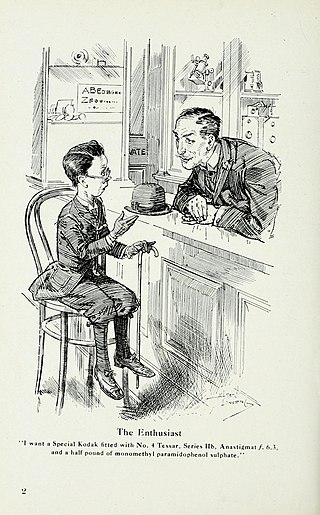
A consumer is a person or a group who intends to order, or use purchased goods, products, or services primarily for personal, social, family, household and similar needs, who is not directly related to entrepreneurial or business activities. The term most commonly refers to a person who purchases goods and services for personal use.

Monopolistic competition is a type of imperfect competition such that there are many producers competing against each other, but selling products that are differentiated from one another and hence are not perfect substitutes. In monopolistic competition, a company takes the prices charged by its rivals as given and ignores the impact of its own prices on the prices of other companies. If this happens in the presence of a coercive government, monopolistic competition will fall into government-granted monopoly. Unlike perfect competition, the company maintains spare capacity. Models of monopolistic competition are often used to model industries. Textbook examples of industries with market structures similar to monopolistic competition include restaurants, cereals, clothing, shoes, and service industries in large cities. The "founding father" of the theory of monopolistic competition is Edward Hastings Chamberlin, who wrote a pioneering book on the subject, Theory of Monopolistic Competition (1933). Joan Robinson published a book The Economics of Imperfect Competition with a comparable theme of distinguishing perfect from imperfect competition. Further work on monopolistic competition was undertaken by Dixit and Stiglitz who created the Dixit-Stiglitz model which has proved applicable used in the sub fields of international trade theory, macroeconomics and economic geography.
Marketing research is the systematic gathering, recording, and analysis of qualitative and quantitative data about issues relating to marketing products and services. The goal is to identify and assess how changing elements of the marketing mix impacts customer behavior.
Positioning refers to the place that a brand occupies in the minds of the customers and how it is distinguished from the products of the competitors. It is different from the concept of brand awareness. In order to position products or brands, companies may emphasize the distinguishing features of their brand or they may try to create a suitable image through the marketing mix. Once a brand has achieved a strong position, it can become difficult to reposition it. To effectively position a brand and create a lasting brand memory, brands need to be able to connect to consumers in an authentic way, creating a brand persona usually helps build this sort of connection.

Pricing is the process whereby a business sets the price at which it will sell its products and services, and may be part of the business's marketing plan. In setting prices, the business will take into account the price at which it could acquire the goods, the manufacturing cost, the marketplace, competition, market condition, brand, and quality of product.
Marketing management is the strategic organizational discipline which focuses on the practical application of marketing orientation, techniques and methods inside enterprises and organizations and on the management of a firm's marketing resources and activities.
In business, a competitive advantage is an attribute that allows an organization to outperform its competitors.

Service economy can refer to one or both of two recent economic developments:

In promotion and advertising, a testimonial or show consists of a person's written or spoken statement extolling the virtue of a product. The term "testimonial" most commonly applies to the sales-pitches attributed to ordinary citizens, whereas the word "endorsement" usually applies to pitches by celebrities. Testimonials can be part of communal marketing.
As part of consumer behavior, the buying decision process is the decision-making process used by consumers regarding the market transactions before, during, and after the purchase of a good or service. It can be seen as a particular form of a cost–benefit analysis in the presence of multiple alternatives.

Online shopping is a form of electronic commerce which allows consumers to directly buy goods or services from a seller over the Internet using a web browser or a mobile app. Consumers find a product of interest by visiting the website of the retailer directly or by searching among alternative vendors using a shopping search engine, which displays the same product's availability and pricing at different e-retailers. As of 2020, customers can shop online using a range of different computers and devices, including desktop computers, laptops, tablet computers and smartphones.
Glen L. Urban has been a member of the MIT Sloan School of Management faculty since 1966 and dean at the school from 1993 to 1998. Urban is a leading educator, prize-winning researcher specializing in marketing and new product development, entrepreneur, and author. He is the Chairman of Sloan's MIT Center for Digital Business.
Marketing intelligence (MI) is the everyday information relevant to a company's markets, gathered and analyzed specifically for the purpose of accurate and confident decision-making in determining market opportunity, market penetration strategy, and market development metrics. Marketing intelligence is necessary when entering a foreign market.
Marketing ethics is an area of applied ethics which deals with the moral principles behind the operation and regulation of marketing. Some areas of marketing ethics overlap with media and public relations ethics.

Market share is the percentage of the total revenue or sales in a market that a company's business makes up. For example, if there are 50,000 units sold per year in a given industry, a company whose sales were 5,000 of those units would have a 10 percent share in that market.
In marketing, a customer value proposition (CVP) consists of the sum total of benefits which a vendor promises a customer will receive in return for the customer's associated payment.
A touchpoint can be defined as any way consumers can interact with a business organization, whether it be person-to-person, through a website, an app or any form of communication. When consumers come in contact with these touchpoints it gives them the opportunity to compare their prior perceptions of the business and form an opinion.
Market environment and business environment are marketing terms that refer to factors and forces that affect a firm's ability to build and maintain successful customer relationships. The business environment has been defined as "the totality of physical and social factors that are taken directly into consideration in the decision-making behaviour of individuals in the organisation."
Product Planning, or product discovery, is the ongoing process of identifying and articulating market requirements that define a product's feature set. It serves as the basis for decision-making about price, distribution and promotion. Product planning is also the means by which companies and businesses can respond to long-term challenges within the business environment, often achieved by managing the product throughout its life cycle using various marketing strategies, including product extensions or improvements, increased distribution, price changes and promotions. It involves understanding the needs and wants of core customer groups so products can target key customer desires and allows a firm to predict how a product will be received within a market upon launch.
The concept of the informed consumer is fundamental in the law of the European Union. Since the European Council Resolution of 14 April 1975, one of the primary objectives of the European Community, and then the European Union, has been the provision of information to consumers. The rationale is that market actors are enabled to make better choices when they are informed and have a greater capacity to understand the importance of their market actions and choices.






